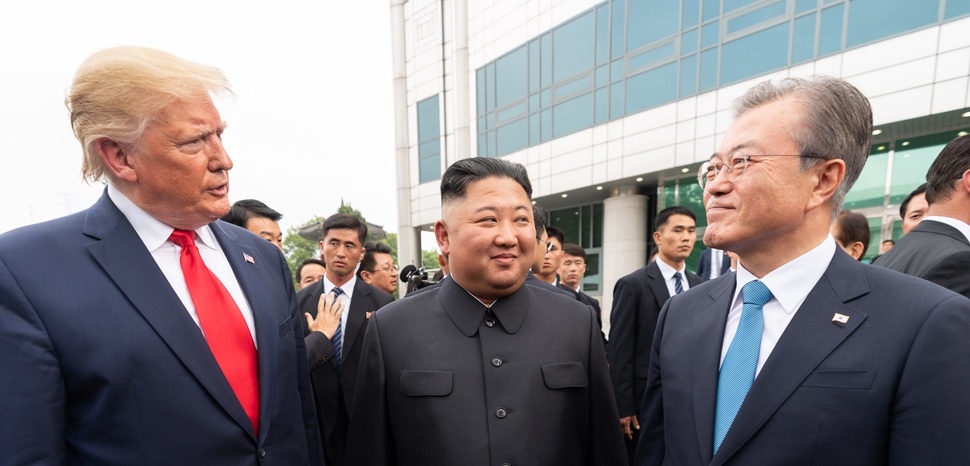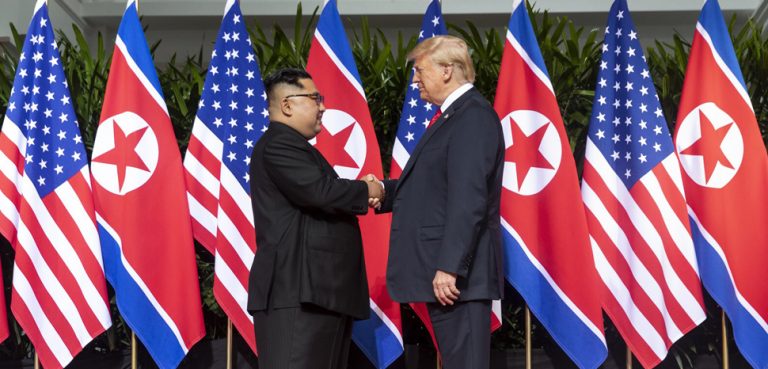Kim Yo-Jong is daring President Moon Jae-In to use his new powers to achieve his forty-year dream of uniting the Koreas, and she appears to be winning.
When the demolition charges brought down the Joint Liaison office on the Korean border on June 16, President Moon Jae-In’s dream for unification crumbled with the structure. Signals from the North at the end of 2017 had prompted Moon Jae-In to send the message to Kim Jong-Un that he was ready to talk and only to talk, because it was the United States that controlled the sanctions. President Moon at best could only function as a marriage broker and encourage a face-to-face meeting between President Donald Trump and Chairman Kim Jong-Un.
The Singapore summit that followed was a stage performance and love fest that produced headlines. Then, the Hanoi summit gave only sneers while the October one-day Stockholm Conference ended with Kim Myong Gil, the head of the North Korean delegation, announcing that further discussions were useless.
Through the two years of disappointments, there remained a vague hope that something could be salvaged from what had begun with such promise. Donald Trump revealed that he was getting love letters from the alias Rocket Man, but the romance was going nowhere. In spite of the inertia, the North remained amiable with the South. Plans were discussed to link their railway networks only to have Washington veto them.
For Seoul, the linkage means that goods can be shipped overland to Central Asia and to Europe. If gas and oil pipelines from Russia could be included, it would reduce energy costs for the South. South Korean businesses are looking at the untouched market of twenty-five million consumers and the possibility of infrastructure construction contracts to stimulate the stagnant Southern economy.
Suddenly on June 4, the tone from the North shifted to a barrage of threats and insults. Kim Yo-Jong, the younger sister of the Chairman and the head of the Committee for the Peaceful Reunification of the Country showed no restraint in her vitriol, which ended with the dramatic destruction of the Joint Liaison building and the hope that it symbolized.
On April 15, President Moon celebrated an unexpected political victory. His Democratic Party gained a majority of one hundred and eighty seats in the parliament of three hundred, granting Moon Jae-In the numbers needed to pass long-delayed legislation. Up North, a new strategy of threats and insults was applied. Underlying the strategy was desperation, resulting from the fact that COVID-19 had forced the closure of the Chinese border through which North Korea imports most of its food.
Before the electoral victory, threatening and insulting the president would have been a waste of time. He did not have the political means to grant any of Pyongyang’s demands. Now that has changed and Kim Yo-Jong has been probing to see if President Moon has the will to exercise his new power. Results favorable to the North are already appearing.
On July 3, President Moon shuffled members of the cabinet. Lee In-young of the ruling Democratic Party was nominated as the new minister of unification and Im Jong-seok, former presidential chief of staff has been appointed as a special presidential advisor. Lee In-young is known as a facilitator and is expected to push controversial legislation through parliament, potentially including a bill ignoring the sanctions. Im Jong-seok was charged with violating the national security laws in 1989 after he allegedly promoted illegal meetings between South Korean activists and DPRK officials in Pyongyang. Like Moon Jae-In, many of his close advisors are strong supporters of unification with the North.
Moon Jae-In has two years of his single five-year term as president to implement his policies and no hope that any change is forthcoming from Washington. Instead, the atmosphere towards the formerly close ally is turning hostile. Donald Trump is demanding a five hundred percent increase in payments by South Korea to maintain the 29,000 troops in the country. As a warning of possible things to come, Donald Trump has expressed his intent to withdraw all U.S. forces. Already, the U.S. has dismissed two hundred thousand civilian employees whose salaries are being covered by Seoul, until an arrangement with Washington is concluded. After the unexpected withdrawal of U.S. support for the Kurds and the withdrawal of twelve thousand troops from Europe, the South Koreans no longer see the United States as a reliable ally.
One way for Moon Jae-In to use his new power is to bypass the US sanctions. With the Chinese and the Russians on the Security Council in the United Nations, there is little chance of retaliation. The only danger comes from the United States, but there isn’t much interest in Washington, with all of its domestic issues, to bother with the Koreas. Kim Yo-Jong is daring President Moon to defy Donald Trump and to take a leading position while he has the opportunity. In two years, his political career and chance to change history will be gone. It’s now or never; and he is showing signs of breaking. If he does, East Asia will be thrown into chaos with Taiwan’s and Japan’s future security in doubt.
The views expressed in this article are those of the authors alone and do not necessarily reflect those of Geopoliticalmonitor.com or any institutions with which the authors are associated.




